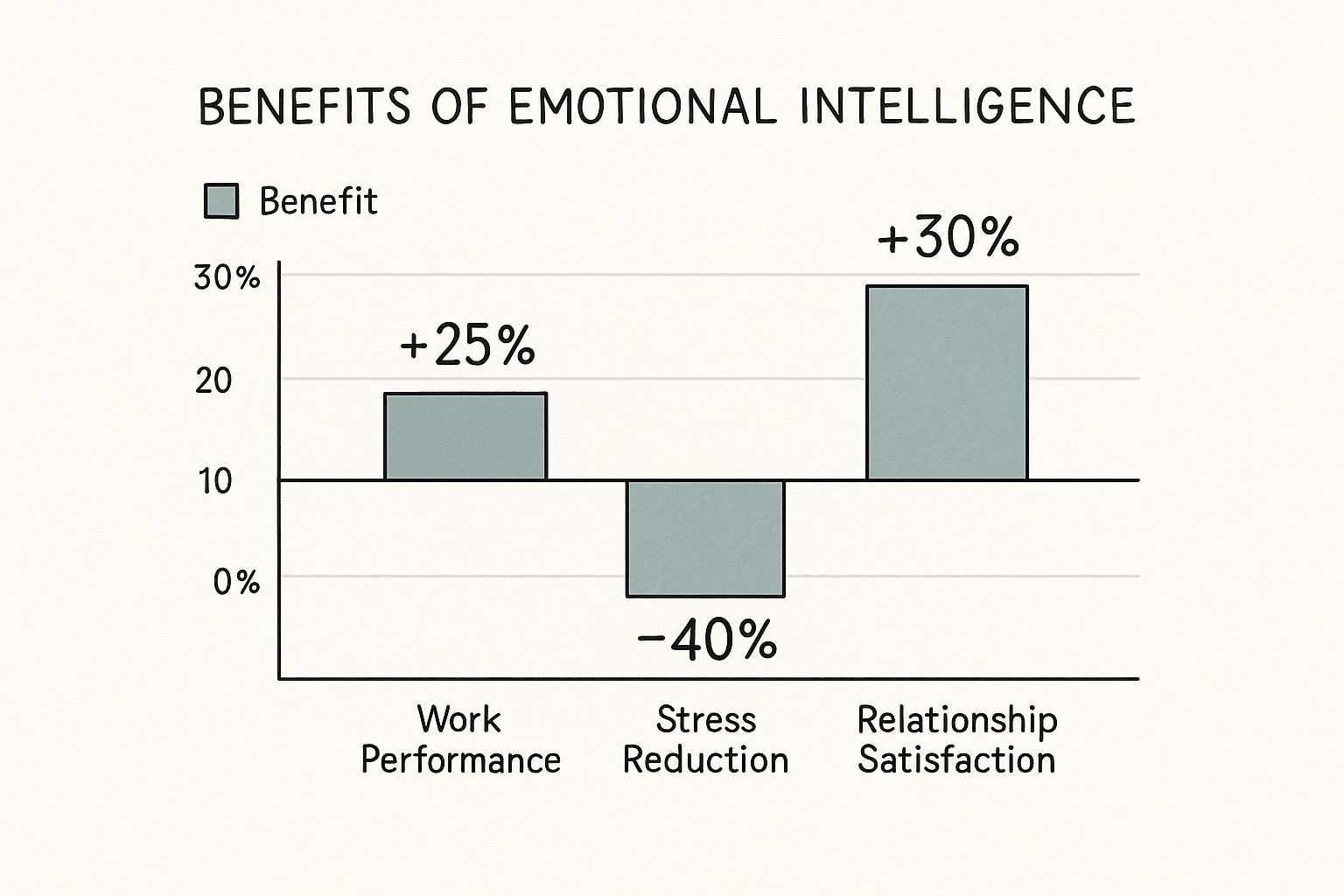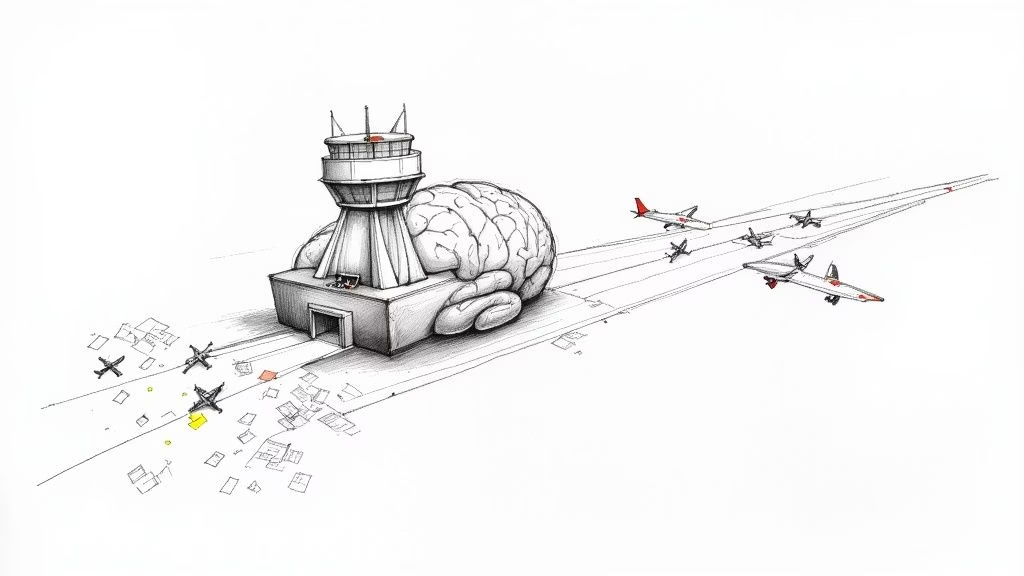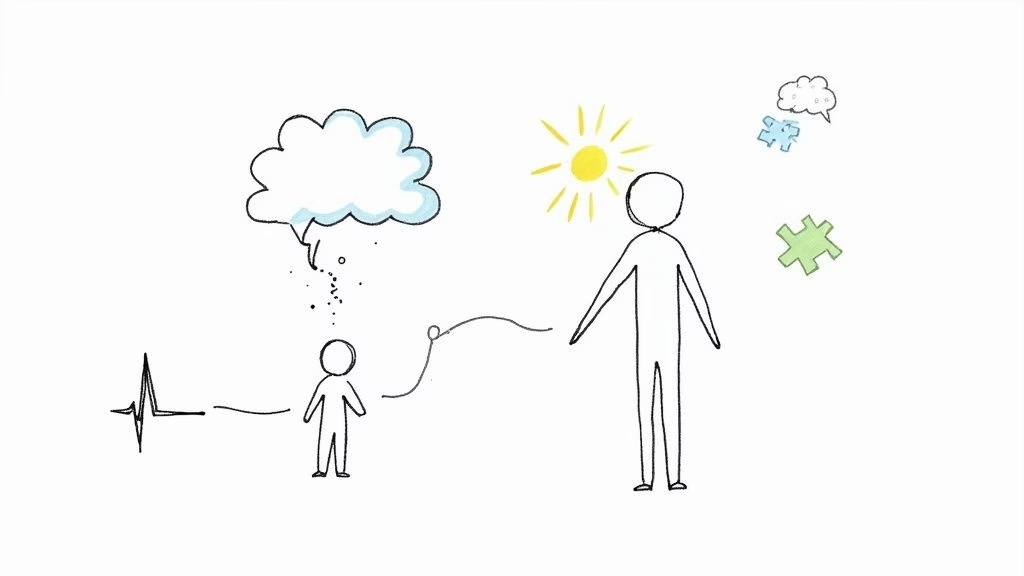Ever feel like you’re drowning in exam stress, or that your friends just aren’t on the same page as you? That’s where emotional intelligence—or EI—comes in. Forget the boring psychology jargon; think of it as your secret weapon for navigating life's ups and downs.
It’s all about getting a handle on your own feelings and understanding what makes other people tick.
Why Emotional Intelligence Is Your Real Superpower
Learning to master emotional intelligence is what helps you deal with everything from the pressure cooker of school to the inevitable drama that comes with friendships. Once you can actually name what you're feeling—whether it’s anxiety spiking before a big test or frustration after a misunderstanding with a friend—you start to gain control.
This is a massive advantage for beating procrastination, finding the motivation to actually do your schoolwork, and building friendships that feel real and supportive.
In a world filled with the endless scroll of social media and the pressure to compete, knowing how to manage your emotions is a total game-changer. This isn't about bottling up tough feelings or pretending they don't exist. It's about understanding them so they don't end up running your life. For teen guys, especially, learning to express emotions in a healthy way is a sign of true strength and resilience.
Finding Support and Resources
The good news is, you don’t have to figure this all out on your own. There are tons of great resources out there designed to help teens and young men build these exact skills.
- Mental Health for Teens: Websites like The Jed Foundation and Teen Mental Health are packed with articles, research, tools, and support made specifically for teens.
- Mens Groups: Organizations like The ManKind Project and Evryman create safe spaces for guys to connect and have honest conversations, which is crucial for young men who are struggling.
- Meditation Guides: Apps like Calm and Headspace have guided meditations that are perfect for reducing stress and getting your focus back, especially when school feels overwhelming.
Building emotional intelligence is one of the most practical things you can do for yourself. It directly affects how you handle stress, stay motivated, and connect with people on a level that actually matters.
It definitely takes practice, but the payoff is huge and lasts a lifetime. In fact, the numbers don't lie—emotional intelligence is a rare but incredibly powerful skill.
Research shows that only about 36% of people can accurately identify their own emotions as they happen. Yet, EI is responsible for 58% of performance in all types of jobs. What's more, a staggering 90% of top performers have high emotional intelligence, and on average, they make $29,000 more per year than people with lower EI. You can dig into more of these emotional intelligence statistics to see the full picture.
This guide will walk you through exactly how to start building this skill so you can crush it in school and in life.
Get to Know Your Inner World Through Self-Awareness
The first stop on our journey into emotional intelligence is learning to get real about what’s happening inside your own head. This isn't some vague, philosophical quest to "know yourself." It's a practical, hands-on skill. Think of it as learning to tune in and actually listen to your feelings, without immediately judging them as good or bad.
A surprisingly powerful way to start is just by naming what you're feeling. Seriously. When that familiar knot forms in your stomach before a big test, is it anxiety? Fear of failing? Or maybe frustration because you don’t feel prepared? Getting specific is everything.
When you practice naming your emotions, you start to build a map of your inner world. Instead of getting hit by a confusing tidal wave of "feeling bad," you begin to see the individual currents: maybe some frustration, a little sadness, and a dose of stress. It’s the difference between being lost in a dark forest and having a flashlight to see the path.
Identify Your Emotional Triggers
We all have them. Triggers are those specific situations, words, or even people that set off a big emotional reaction. Maybe it’s a certain tone of voice your mom uses, a casual comment from a friend about your outfit, or seeing someone on Instagram living a life you wish you had.
Figuring out what your personal triggers are gives you a huge advantage.
Think back to the last time you felt a sudden rush of anger or sadness. What happened in the moments right before? Ask yourself a few questions:
- Who was I with?
- What was I doing?
- What was said, or what thought just popped into my head?
Understanding the "why" behind your reactions is the key to eventually managing them. It doesn't mean you'll magically stop feeling things, but you’ll see them coming. For a deeper dive, you can explore more on https://andrewpetrillolifecoaching.com/how-to-improve-self-awareness/ to build this muscle.
Connect Feelings to Physical Sensations
Long before your brain has fully processed an emotion, your body is already reacting. A racing heart before you give a presentation, a tight chest when you're feeling hurt, or sweaty palms during an awkward conversation—these are all physical signals tied directly to your emotions.
Start paying attention. A clenched jaw might be your body's first clue that you're feeling stressed. A pit in your stomach could be your early warning sign for anxiety.
Even things in your environment can play a part. Have you ever noticed how a certain smell can instantly change your mood? Understanding how scents can influence your emotions shows just how deeply we're connected to the world around us.
Learning to decode these physical messages is like creating an emotional early-warning system. It gives you a chance to hit pause and choose how you want to respond instead of just reacting on autopilot.
Decoding Your Body's Emotional Signals
Your body speaks a language of its own. This table can help you start translating what those common physical sensations might be trying to tell you about your emotional state.
| Physical Sensation | Potential Emotion | What It Might Mean |
|---|---|---|
| Racing heart, shortness of breath | Anxiety, Fear, Excitement | Your body is in a "fight or flight" mode, preparing for a perceived threat or a significant event. |
| Tightness in chest, lump in throat | Sadness, Grief, Hurt | This is often a physical manifestation of emotional pain or the effort of holding back tears. |
| Clenched jaw, tense shoulders | Anger, Stress, Frustration | Your muscles are tensing up, readying for conflict or bracing against pressure. |
| Butterflies in stomach | Nervousness, Excitement | This fluttering feeling is caused by blood flow changes in your digestive system during high-arousal states. |
| Feeling heavy or slow | Sadness, Fatigue, Burnout | Your body is signaling a need for rest and recovery, either emotionally or physically. |
By becoming a better translator of your body's signals, you gain a massive head start in understanding what you're truly feeling in the moment.

As you can see, building these skills isn't just about feeling better—it leads to real, measurable improvements across your life, from school performance to your relationships.
Beat Procrastination and Find Your Motivation

We've all been there, right? Staring down a massive school project, but somehow deciding to watch just one more episode instead. Procrastination often isn't about being lazy; it's driven by emotions like the fear of failing, feeling completely swamped, or a simple lack of motivation.
This is where understanding how to develop emotional intelligence becomes your secret weapon for getting things done.
When you can pinpoint what you're actually feeling, you can start dealing with the real reason you're putting things off. Are you anxious about not getting a perfect grade? Are you frustrated because you have no idea where to even start? Just naming that emotion can shrink it down to a manageable size and let you think more clearly about your schoolwork.
That flicker of self-awareness is the first real step to kicking procrastination to the curb and tapping into your genuine motivation.
Break Down Overwhelming Tasks
Looking at a five-page essay or a final exam on your calendar can feel like staring up at a mountain. It’s so big it’s paralyzing. The natural emotional response is to just shut down. But by using a little emotional regulation—a key piece of emotional intelligence—you can break that mountain down into small, manageable hills.
So, instead of a to-do list that just says, "write the essay," try this instead:
- Brainstorm three main ideas
- Find one source for each idea
- Write just the introduction
- Draft the first body paragraph
See the difference? Each tiny checkmark gives your brain a little hit of dopamine. That builds momentum and makes the next step feel so much easier. This simple shift trades that overwhelming feeling for a sense of control and accomplishment.
Connect Schoolwork to Your Goals
It's tough to find motivation when school feels totally pointless. I get it. Why memorize dates for a history test when you'd rather be designing video games? Emotional intelligence is what helps you find the hidden link between what you have to do and who you want to become.
You have to think bigger picture. That history class? It's teaching you critical thinking. That impossible math problem? You're building the exact problem-solving skills you'll need to code that game one day. When you start framing your assignments as training for your future, you unlock a powerful internal drive that no amount of nagging from parents or teachers ever could.
A quick but important side note: self-compassion is huge here. Bouncing back from a bad grade without letting that negative voice in your head take over is a massive sign of high emotional intelligence. Try to treat yourself with the same kindness you’d offer a friend who messed up.
This isn't a skill you're just born with. In fact, emotional intelligence naturally develops with age and experience. Research shows older individuals often have higher EI simply because they've had more life to practice, which is why actively working on it now gives you a massive head start. If you're curious, you can read more about how emotional intelligence develops over a lifetime.
Ultimately, turning your emotional insights into academic success isn't a one-and-done deal. It's an ongoing journey of figuring yourself out and growing along the way.
Build Stronger Friendships with Empathy

Once you get a handle on your own emotions, something interesting happens. It’s like a lightbulb switches on, and suddenly, it's easier to see what’s going on with other people.
This is the heart of empathy. It isn’t about feeling sorry for someone; it’s about genuinely trying to see the world from their point of view. For guys, especially, this skill often gets overlooked, but it’s a massive sign of strength and maturity.
Empathy is the glue that turns casual acquaintances into real, lasting friends. When you show someone you’re trying to understand them—without jumping to conclusions or judging them—it builds a deep, powerful level of trust. This is a crucial piece of the puzzle when learning how to develop emotional intelligence, bridging the gap between your own inner world and the people around you.
It all starts with something called active listening. That just means when a friend is talking, you're all in. Put your phone away, face them, and truly hear what they're saying… and just as importantly, what they're not.
Putting Empathy Into Action
Let’s walk through a real-life scenario. Imagine your friend comes to you, totally bummed out after failing a huge test they studied hard for. The standard response is, "That sucks." An empathetic response goes a step further.
Try asking open-ended questions that show you're actually engaged and want to understand.
- "What was the hardest part about that for you?"
- "How are you feeling about it right now?"
- "Is there anything I can do to take your mind off it for a bit?"
Questions like these open the door for your friend to share more, which makes them feel heard and validated. This works in almost any situation, like if they’re fighting with their parents. Before you offer advice, start by simply validating their feelings: "Man, it sounds like that was really frustrating."
Remember, empathy doesn't mean you have to solve their problems. It just requires you to be present with them in their struggle, offering a safe space to be seen and understood.
Working on your listening and responding skills is fundamental. Parents can help by modeling this at home—actively listening to their teens and validating their feelings, even if they don't necessarily agree with their perspective. For more strategies, you can also check out our detailed guide on essential communication skills for teens.
Reading Beyond Words
So much of what we communicate isn't actually said out loud. Research suggests a huge portion of communication comes through our body language, facial expressions, and tone of voice. Learning to read these non-verbal cues is like learning a second language for emotions.
Start paying attention to these signals when you're talking to people:
- Body Language: Are their arms crossed? Are they avoiding eye contact? That could signal they feel defensive or uncomfortable.
- Tone of Voice: Is their voice quiet and shaky? Or is it sharp and loud? The tone often reveals the true emotion hiding behind the words.
- Facial Expressions: A furrowed brow or a clenched jaw can speak volumes, even when someone insists, "I'm fine."
Noticing these small details helps you tune into what people are really feeling. This allows you to navigate social situations with a lot more confidence, build much deeper friendships, and ultimately, become the kind of person others know they can always count on.
Your Guide to Mindfulness and Meditation

Let’s be real—feeling stressed is practically a full-time job for a lot of teenagers. Juggling school, social life, and just figuring out who you are can feel like a marathon with no finish line. Your brain is always on.
This is exactly where mindfulness and meditation can step in. Think of it less as some mystical ritual and more as a practical way to hit the mental reset button.
The whole point is to gently train your focus. It’s about building the muscle you need for better emotional control, a huge part of learning how to develop emotional intelligence. Forget the myth about needing to completely empty your mind. The real goal is just to notice your thoughts without letting them drag you away.
For teen guys, especially, society doesn't always make it easy to talk about feelings. Meditation gives you a private and powerful way to work through stuff and build genuine resilience from the inside out. There are even men's groups and online communities out there focused on helping young men build these exact skills.
A Simple Meditation Guide for Teens
You don't need a special cushion or a perfectly silent mountaintop to get started. All you need is five minutes and a willingness to try. This simple breathing exercise works anywhere—before a test, after a fight, or whenever you just feel like you’re about to short-circuit.
Here's how to do it:
- Find a comfy spot. Sit upright in a chair with your feet on the floor, or just sit on your bed.
- Close your eyes. If that feels weird, you can just look down toward the floor.
- Focus on your breath. Feel the air move in and out. Notice your chest or stomach rising and falling.
- Acknowledge your thoughts. Your mind is going to wander. That’s what minds do. When a thought pops up, just notice it and gently guide your focus back to your breath. No judgment.
- Start small. Set a timer for just three to five minutes. Doing it consistently is way more important than how long you do it for.
This little practice creates a pocket of calm in your day and quiets down a racing mind. If you're looking for more ways to get started, this guide on https://andrewpetrillolifecoaching.com/meditationforteens/ breaks down some other great techniques.
The real power of meditation isn’t just feeling calm for five minutes. It's about training your brain to stay focused and less reactive, which helps you manage procrastination and find motivation for school.
To see just how big of an impact this can have, check out this infographic on the top health benefits of meditation. It’s a great reminder of how a few minutes a day can make a massive difference in your mental and physical health.
Mental Health Resources for Teen Guys
Let's be real: society has a long history of telling guys to just "tough it out" and keep their feelings on lockdown. This section is all about pushing back on that outdated idea and pointing you toward real, practical support.
Learning to understand and manage your emotions isn't a weakness. Honestly, it's one of the smartest and strongest things you can do for yourself.
It’s also more important than ever. Recent research has shown a pretty concerning trend: since 2021, men's emotional intelligence scores have been dropping while women's scores have started to recover. You can dig into the specifics by checking out these emotional intelligence research trends. This growing gap makes it crucial for young men to start actively building these skills.
The best part? You don't have to figure it all out on your own. There are some incredible resources out there made specifically for guys who are struggling or just want to find others who actually get it.
Finding Your Support System
Getting the right people and tools in your corner can change everything. Whether you're dealing with the pressure of school, stuck in a procrastination loop, or just feeling off, you're definitely not the only one.
Here are a few great places to start:
-
Groups for Guys: Organizations like The ManKind Project and Evryman are all about creating safe, judgment-free zones for men and young men. They’re built for having honest conversations about what’s really going on. These groups are fantastic for building connections and seeing firsthand that you aren’t alone in what you’re feeling.
-
Mental Health Info for Teens: Websites like The Jed Foundation and Teen Mental Health are treasure troves of articles, tools, and direct support lines designed specifically for people our age. They offer solid, reliable information on everything from handling anxiety to figuring out healthy relationships.
-
A Note for Parents: If you're a parent trying to support your son, the game is all about open communication. Your main goal should be creating a home where he feels safe enough to express himself without fear of judgment. Validating his feelings—even when you don't fully understand them—is the foundation of trust.
Remember, reaching out and learning how to handle your inner world is a sign of true strength. It’s an investment in your future well-being, success, and happiness.
Answering Your Questions About Emotional Intelligence
It's natural to have a few questions as you start exploring emotional intelligence. After all, it’s not exactly a subject they teach in high school. Let's tackle some of the most common ones that come up for both teens and their parents.
How Can Parents Help Their Teen Develop These Skills?
As a parent, you have a huge opportunity to support your teen simply by creating a home where talking about feelings is normal. The single best thing you can do is model healthy emotional expression yourself. When you talk openly about your own stress or frustration in a constructive way, you're teaching your teen that these feelings are manageable and not something to hide.
Another powerful tool is validation. When your teen opens up, your first instinct might be to jump in and solve the problem. Instead, just listen. A simple acknowledgment like, “Wow, that sounds incredibly frustrating,” or “I get why you would feel hurt by that,” goes a long way. It builds trust and shows them you're a safe person to talk to, making them more likely to come to you in the future.
What if My Son is Having a Hard Time?
Let's be honest: society puts a lot of pressure on boys to be "strong" and bottle up their feelings. This can make it incredibly difficult for them to talk about what's really going on. If you notice your son is struggling with a lack of motivation, constant procrastination, or just seems down, connecting him with the right resources is crucial.
- Peer Support: Groups like The ManKind Project offer safe, non-judgmental spaces for young men to connect with others and share what they're going through.
- Teen-Specific Resources: Websites like The Jed Foundation and Teen Mental Health are packed with articles, research, and support designed specifically for the challenges teens face today.
Guiding a teen toward helpful resources is one of the most empowering things you can do. It equips them to build resilience on their own terms.
I'm Feeling Totally Overwhelmed. Where Do I Even Start?
If you’re staring at all this information and just feeling more stressed, take a deep breath. The key is to start small. Don't try to become an emotional intelligence expert overnight.
Just pick one, tiny practice and stick with it. Remember that 5-minute meditation guide we talked about earlier? That's a perfect starting point.
Taking just a few minutes every day to sit quietly and focus on your breathing can work wonders. It creates a small pocket of calm and helps you feel more in control, which is the foundation of self-awareness. That first small step is always the hardest, but it's also the one that gets you moving.
At Andrew Petrillo Life Coaching, we help teens and young adults swap overwhelm for action with practical strategies that build real, lasting confidence. If you're ready to find clarity, get motivated, and develop the emotional tools for success in school and life, let's talk. Book a complimentary discovery call today.



















